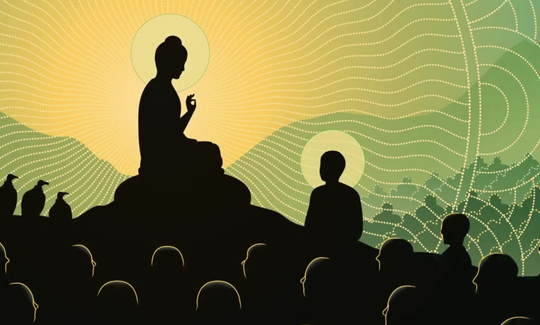-
Whatever is not yours… Comment December 18, 2016 -
Speak only endearing speech Comment December 18, 2016 -
A lie is like a snowball… Comment December 18, 2016 -
The Rabbit – A Tale of Selfless Generosity Comment December 17, 2016Buddha used to be a rabbit in one of his previous lifetimes
A Tale of Selfless Generosity.
In this lifetime the Bodhisattva was born as an animal, a rabbit. Yet even as a rabbit, he possessed incredible virtue, goodness, beauty, and vigor; so much so that the other animals viewed him as their king. None feared him and none caused him fear. Among his devoted following, three animals in particular became his closest students and companions. They were an otter, a jackal, and a monkey, who through the Bodhisattva’s teaching, forgot their lower animal nature and became infinitely compassionate themselves.
As instructed by the rabbit in a teaching one night, it was customary that on the next day, a holy day, to offer alms to anyone who passes through their forest. Later that night, the rabbit was distraught as he realized he had nothing to offer. His three companions had ample means to feed a guest, but the rabbit had nothing but the meager blades of grass he ate to sustain himself, which were far too bitter to offer a visitor. Then he realized he could offer his own flesh as food and without hesitation, decided this was what he would do.
Hearing this, Shakra, the lord of gods, went to test the animals and disguised himself as a weary traveler who had lost his way. Hungry, thirsty, and crying with despair, the four beasts rushed to his aid. The otter was able to supply the man with seven fish, the jackal a lizard and some sour milk, and the monkey some soft ripe mangoes. Seeing that the man had built a fire, the rabbit explained that he was offering his own body and then, without hesitation, lept into the hot coals and swirling flames.
Shakra rejoiced, reached into the fire and pulled out the rabbit and then lifted him up into the heavens and displayed him before the gods. Continue reading
-
What you say or do… Comment December 17, 2016 -
My to-do list for today Comment December 17, 2016 -
Only three things matter Comment December 17, 2016 -
The truly humble work in silence Comment December 17, 2016 -
Follow then the shining ones Comment November 28, 2016 -
Those who lead others through nonviolent Comment November 28, 2016


















